Bob Anderson
David Constantine MBE
Illac Diaz
Najat Ikhich
Firdaus Kharas
Douglas MacLagan
Janet Maro
Maanda Ngoitiko
Tony Rinaudo
Peace Ruzage
Bob Anderson
Burma Education Partnership
With no prior qualifications, the teachers Bob has trained are now sitting internationally accredited Cambridge English exams.

As a teacher in a Durham school, Bob Anderson led a double life. When not in front of the class he was often on the frontline of conflicts, working as a photojournalist for the London agency, Rex Features. In 1996, an assignment took him to the Thai/Burmese border, home to a growing number of refugees from the Karen ethnic minority. While working in the camps, Bob heard the community's call for support to educate their displaced children and decided to do what he could to help.
For four years, Bob returned to the camps annually to teach, operating under the radar, as the camps were vulnerable to attacks and off limits to foreigners. In 2000, he brought a team of three volunteer teachers with him to provide a short summer school. During the trip, Bob developed a blood clot in the leg which travelled to his lung. He was nursed by the Karen community until evacuated. It was during his recovery period that he began to build his charity, the Burma Education Partnership.
Echoing Bob's own relationship with the camp communities, the charity's teacher-to-teacher training model is based on the development of both professional and personal partnerships. Course books have been developed for 18,000 refugee children and training delivered to hundreds of teachers, often via mobile training units designed to operate in difficult contexts. With no prior qualifications, the teachers Bob has trained are now sitting internationally accredited Cambridge English exams.
The bedrock of the small charity is to provide human contact between British and Karen's isolated teachers. This warm approach has given rise to a viable, sustainable model of education that will significantly improve the chances of Karen children as they face a long road ahead.
David Constantine MBE
Motivation
With 98% of disabled children in the developing world still barred from the classroom, David's work is a practical way of empowering people, one wheelchair at a time.
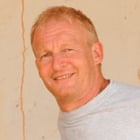
At 21, David lost the use of his body. Backpacking around Australia with a just camera and a surfboard, he dived into a shallow pool on Fraser Island and broke his neck, leaving him paralysed from the shoulders down. Thirty years on, he is responsible for supporting over hundreds of thousands of people with disabilities to achieve their potential.
After his accident in 1982, David went on to study at the Royal College of Art, which opened up the world of industrial design. He and a friend entered a competition to design a rugged, affordable wheelchair suitable for the rough terrain of many developing countries. Their design won them the Frye Memorial Prize and the pair used the money to travel to Bangladesh to build the wheelchair for a local disability organisation. The success of the prototype led to the creation of a wheelchair workshop in Dhaka under the umbrella of a new mobility charity, Motivation, which David founded in 1991.
Since then, the organisation has taken the lead in designing low-cost, high-quality wheelchairs, producing over 12,500 last year. Undeterred by his own disability, David has used the charity to tackle inclusivity in sport, education and industry on a global level. A core partnership with Marks and Spencer has lead to the employment of 700 people with mobility disabilities as factory workers in Sri Lanka. But the core aim of Motivation remains focused on those wheelchairs, helping each person to become as mobile and active as possible within society.
David continues to offer senior advice at the crossroads between advocacy, enterprise and design. In 2010, he was appointed MBE in 2010 in recognition of his dedication to mobilising people with disabilities worldwide. With 98% of disabled children in the developing world still barred from the classroom, David's work is a practical way of empowering people, one wheelchair at a time.
Illac Diaz
Litre of Light
Working with disaster relief agencies, Illac focused on finding a way to bring emergency lighting and power to refugee areas.

When Typhoon Ondoy hit the Philippines in 2008, graduate student Illac Diaz suspended his studies and flew home to help. Working with disaster relief agencies, he focused on finding a way to bring emergency lighting and power to the refugee areas. In a country where 20 million people live off the electric grid, he had to think outside the box.
What he came up with was revolutionary: combining a recycled plastic bottle, a capful of bleach and distilled water, he designed the Litre of Light. Placed through a hole in the common steel sheet roofs, sunlight refracts through the water in the bottle. Once below the ceiling, the light bends to light the space below with 55 watts of brightness, without the need for electricity.
The process and the instructions are entirely open-source and spread using traditional and digital social networks. This enables any community to develop their own grassroots micro-solar industry using locally sourced, sustainable, and affordable materials. The bottle lights last for five years and save households an average of $10 off electricity bills each month. With just one month's savings, people can purchase a locally produced solar LED light and mobile charger upgrade unit that is inserted into the existing solar bottle light, providing an extra 10 hours of power after dark.
Since April 2011, over 120,000 households in the Philippines have lit up their homes in this way and Illac's idea has inspired a global movement; the Litre of Light is now in over 350,000 households in ten countries around the world. Illac has shown that communities do not have to wait for imported solutions to local problems. The power is in the hands of the people.
Najat Ikhich
Caravan Programme
Najat's work continues to take her to some of the poorest parts of the country where early marriage is common and girls are often mothers by the age of 15.
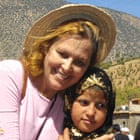
Najat Ikhich's first success was convincing her father to let her go to school. At the age of 15, she used the same determination to narrowly avoid being married to her cousin. With her father in prison and her family on the poverty line in her Moroccan community, early marriage was considered the only option. Her refusal was unbearable to her mother; their split lasted a long time.
At university, Najat became a core part of the rising national feminist movement. After graduating, she founded the prominent human rights organisation Association of Human Rights (Association Marocaine des Droits de l'Homme) and later YTTO. Her work, primarily against gender-based violence, continues to take her to some of the poorest parts of the country where early marriage is common and girls are often mothers by the age of 15.
With communities reluctant to discuss change, Najat has adopted a unique approach. In 2008 she launched her 'Caravan Programme' taking a team of medics, lawyers and social workers in caravan to remote rural areas.
While the medical staff carry out health check-ups, the legal team are able to introduce concepts of family law, a minimum age for marriage and inheritance rights. In 'consultation' tents, social workers invite women and girls to share their stories and engage in dialogue around issues linked to women's empowerment and child marriage.
Since the start of the Caravan Programme, the prevalence of child marriage has dropped drastically in many of the villages. One village saw a drop from 450 underage marriages in 2010 to just 50 in 2012. Far more women and girls are learning how to read and write. Others have started cooperatives with Najat's help.
With that same determination that helped to break the cycle of early marriage in her personal life, Najat has helped to break the isolation of many of Morocco's forgotten communities.
Firdaus Kharas
Chocolate Moose Media
Using animation, Firdaus tackled subjects often shrouded in taboo and misinformation, particularly HIV, malaria, and domestic and sexual abuse.

Firdaus Kharas makes things happen by making people laugh. By animating condoms and creating cartoon mosquitos, he has turned very adult messages into child-friendly stories and in doing so, is challenging some of the behaviour practices that put people at risk globally.
Growing up in Calcutta Kharas, Firdaus was no stranger to the cycles of poverty. A visit, at the age of eight, to Mother Theresa's hospice left an indelible mark. Realising that mass behaviour change required mass communication, Kharas took a gamble in 1995 and launched his communications company, Chocolate Moose Media with virtually no experience in the field. Using animation, he tackled subjects often shrouded in taboo and misinformation, particularly HIV, malaria, and domestic and sexual abuse.
One cartoon on AIDS prevention, which depicted three condoms as 'Three Amigos', likened unprotected sex to betting your life on the spin of a roulette wheel. Launched by the UN in 2005, it has been broadcast in 70 languages and dialects to 80% of the world's population. His humorous cartoon on malaria prevention, Buzz and Bite, has been released globally in 30 languages and his 2011 animation 'No Excuses' turned the lens on cultural justifications for domestic and sexual violence. A production for Al Jazeera Children's Channel on tolerance ran daily for two years in the Arabic-speaking world.
Almost entirely self-funded, Kharas' next challenge is to convince 1.3 billion people around the world living off-grid to switch from dangerous kerosene lamps and solid fuels to solar-powered alternatives. By combining accessible humour and hard-hitting messaging, his productions will no doubt continue to shine a warm light on some of the most pressing issues facing societies.
Douglas MacLagan
Child Welfare Scheme Nepal
From rural support to national advocacy, Douglas is committed to the future of every child he works with.

During a trek in Nepal, aged 28, Douglas MacLagan was handed a sick baby by her distraught mother. Unable to help, he just held her. She would die that night. Deeply disturbed by the poverty of child health services in that rural region, Douglas returned home, sold up his house and possessions and moved to Nepal, returning to the village where the baby died. Together with the villagers, he established two day care health centres through his newly founded NGO, the Child Welfare Scheme Nepal. The centres provided free health care and child care for working parents. With requesting coming in from surrounding villages for similar centres, and Douglas's personal savings dwindling, he set up a registered charity in Hong Kong to fundraise for the development.
For children needing more advance treatment, Douglas set up the 'Asha' (hope) clinic, which specialised in paediatric and maternal care. Embedded in the community, it highlighted many of the causes of child mortality, which steadily decreased under its management. Douglas remained actively involved in finding solutions to health problems. When staff at the clinic recognised that children were suffering as a result of smoke from traditional kitchen fires, he introduced a new stove to prevent inhalation and reduce the risk burns from open fires.
When the decade-long Maoist insurgency forced large numbers of children onto Nepal's streets, Douglas established the Jyoti Vocational Training and Rehabilitation Centre (JVTC) and the Jyoti Street Project (JSP) to provide shelter and opportunities for street-dwelling youth.
The Child Welfare Scheme Nepal has now been handed over to the community to manage while Douglas has set up another NGO, Right4Children, to increase national awareness of children's rights. From rural support to national advocacy, Douglas is clearly committed to the future of every child he works with.
Janet Maro
Sustainable Agriculture Tanzania (SAT)
When it comes to organic farming, the 25 year-old Tanzanian holds wisdom beyond her years.
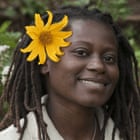
Farmers travel hundreds of kilometres to hear Janet Maro speak. When it comes to organic farming, the 25 year-old Tanzanian holds wisdom beyond her years. As a student of agriculture and agribusiness in the rural area of Morogoro, she witnessed farmers' struggle against the effects of climate change, food shortages, deforestation and crop disease. She was attentive to their inquisitiveness about how to make compost, identify pests and adopt environmentally-friendly practices.
These exchanges led to the launch of the Bustani ya Tushikamane project, which delivers accessible training on controlling pests and disease using ecological methods. Maro and her team teach communities how to harness botanical extracts, repellent plants, and how to improve soil fertility using composting, green manures and organic liquid fertilisers. Bridging online and off-grid communities, she has translated agricultural e-manuals from the internet into KiShwahili and local languages.
In June 2011, drawing on the success of the project, Maro founded the umbrella organisation, Sustainable Agriculture Tanzania (SAT). Today, SAT works with over 300 farmers (60% of whom are women) and has become the leading centre for organic and sustainable agriculture in Tanzania.
Under Maro's guidance, 24 farmers in Towelo have achieved Tanzania's first East Africa Organic Products Standards certification. A further 216 are on a permanent training programme with SAT and over 125 famers and 100 of their children have attended SAT-led workshops. To ensure the learning is shared as widely as possible, Maro has set up a popular information centre, a free demonstration garden and a mobile office. To ensure there is a market for the produce, Maro has launched a successful organic shop in the city of Morogoro. With her vision and energy, Maro has sowed the seed for long-lasting change in her community and beyond.
Maanda Ngoitiko
Pastoral Women's Council (PWC)
There were few that directly addressed the needs and issues of other Maasai women and girls, particularly access to education. Maanda filled this gap.
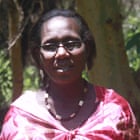
The daughter of a pastoralist Maasai family in northern Tanzania, Maanda Ngoitiko was betrothed at 12. Desperate to continue her education, she convinced her parents to let her finish primary school. At the age of 15, as marriage loomed again, Maanda ran away to complete her secondary education in Dar Es Salaam. Her hard decision and hard work was rewarded when she succeeded in gaining a scholarship from the Irish Embassy to study Development Studies in Ireland. On graduating she returned to Tanzania to work for a Maasai community group and was struck by the lack of organisations led and managed by Maasai women. There were few that directly addressed the needs and issues of other Maasai women and girls, particularly access to education. Maanda filled this gap in 1997, along with nine other women, founding the Pastoral Women's Council (PWC).
They started to develop local women's action groups which offered a open, supportive forums for sharing issues that affected women. The decisions made at these forums have translated into the development of practical projects focused on building the potential and confidence of Maasai women and girls. Today, the organisation has a membership of approximately 6,000 women.
Maanda's leadership has lead to the distribution of micro-grants and the successful transfer of land titles for widows. But perhaps the most poignant measure of success for Maanda are the 145 girls currently studying at secondary schools, vocational colleges and universities with PWC's sponsorship. And that number will rise. In her home district, the council have agreed to build two new secondary girls schools and have doubled their budget for girls' education. These commitments speak volumes about Maanda's success in changing attitudes and perceptions about the importance of educating Maasai women. Because of her strength, fewer girls will be forced to flee to find a future.
Tony Rinaudo
Farmer Managed Natural Regeneration (FMNR)
Tony taught famers how to nurture the root shoots back into strong trees. Rather than spending millions on traditional reforestation techniques with poor results.

Under Niger's arid soil there is an underground forest: a vast network of sprouting tree roots that have survived the the harsh deforestation that has crept across the country. It is the same landscape that Tony Rinaudo has seen devastate communities; working in Niger since 1980, he has provided relief through five separate years of famine. The existence and the potential of a living plant system just under the dry earth was a revelation. Tony taught famers how to nurture the root shoots back into strong trees. Rather than spending millions on traditional reforestation techniques with poor results, Tony's method, known as Farmer Managed Natural Regeneration (FMNR), has given subsistence farmers a way to take control of their own land and bring it back to life. Villages practicing FMNR across Niger now have 10 to 20 times more trees than 20 years ago and are reviving an estimated 1.25 million trees each year. As a result, Niger is the only country in Africa experiencing rapid reforestation.
In 1999, Tony joined World Vision Australia and was able to spread awareness and design wider 're-greening' projects. FMNR is now present in 16 countries with 9 more countries planned for 2014 including Uganda, Kenya, Tanzania, Rwanda and Ethiopia. Similar movements are unfolding in East Timor and East Sumba (Indonesia), and activities have started in Myanmar, India and Philippines. In Senegal, 50,000 hectares have been reforested in just four years.
Tony's insight, coupled with his dedication to sharing this model of reforestation, has had a direct impact on the increase in food security and decrease the risk of floods and drought in the countries using FMNR. While he is quick to acknowledge existing indigenous awareness of re-greening methods, his efforts to share the practice across vast networks of farming communities has prompted a powerful movement that will protect countless lives and livelihoods.
Peace Ruzage
Aspire
Each year, Peace reaches out to 50 of the most marginalised women in Gisozi, providing child care to ensure mothers are able to attend skills workshops.
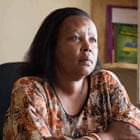
Peace Ruzage returned from Kenya to her native Rwanda after the 1994 genocide to support her surviving family. Settling in the poorest area of Kigali, she witnessed the impact of the genocide on women, particularly single mothers and widows. Many had been forced onto the streets to feed their families. Isolation and unemployment were rife. Inviting neighbouring women to sit on her veranda, Peace taught them to made beads from waste paper. As they crafted the beads, her mother taught them to read and write. The small circle quickly bloomed into a gathering of 300 each day. The veranda became a place to share worries and find common ground. Hostilities gave way to friendship and working cooperatives were born.
Peace recognised the power of this simple communal space and, when she crossed paths with NGO worker, Sophie McCann from the UK charity, Network for Africa, they decided together to develop a project that would roll out the same support to a wider network of women. In 2009, Peace's project became Aspire, a non-profit organisation based in Gisozi. Over the last four years, it has engaged 450 women in vocational training and rights awareness. Each year, Peace reaches out to another 50 of the most marginalised women in Gisozi, providing child care to ensure mothers are able to attend skills workshops. A new DfID grant has given rise to a sister project in the rural area of Rutunga for 150 women each year.
With the trust she has gained, Peace has opened up dialogue around reproductive health and family planning between women and their husbands. In a recent survey, 73% of women said they had changed their approach to family planning as a result of her advice.
Known as 'aunty' Peace continues to sit with the women and share their concerns and hopes. By listening before acting, she has found ways not only to address women's economic needs but also the underlying factors that keep them impoverished.